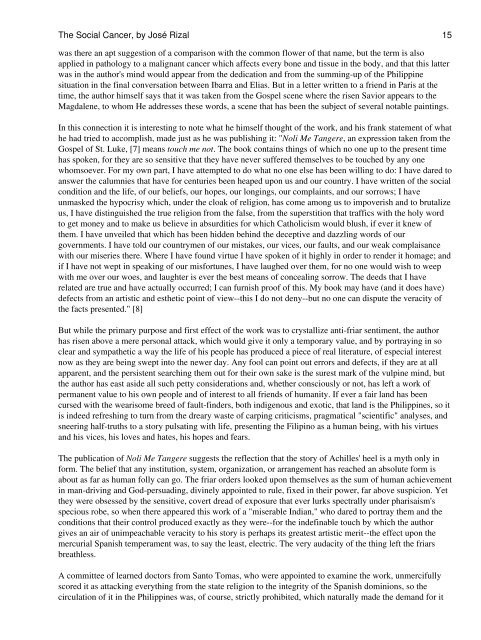The Social Cancer, by José Rizal - Home
The Social Cancer, by José Rizal - Home
The Social Cancer, by José Rizal - Home
Create successful ePaper yourself
Turn your PDF publications into a flip-book with our unique Google optimized e-Paper software.
<strong>The</strong> <strong>Social</strong> <strong>Cancer</strong>, <strong>by</strong> <strong>José</strong> <strong>Rizal</strong> 15<br />
was there an apt suggestion of a comparison with the common flower of that name, but the term is also<br />
applied in pathology to a malignant cancer which affects every bone and tissue in the body, and that this latter<br />
was in the author's mind would appear from the dedication and from the summing-up of the Philippine<br />
situation in the final conversation between Ibarra and Elias. But in a letter written to a friend in Paris at the<br />
time, the author himself says that it was taken from the Gospel scene where the risen Savior appears to the<br />
Magdalene, to whom He addresses these words, a scene that has been the subject of several notable paintings.<br />
In this connection it is interesting to note what he himself thought of the work, and his frank statement of what<br />
he had tried to accomplish, made just as he was publishing it: "Noli Me Tangere, an expression taken from the<br />
Gospel of St. Luke, [7] means touch me not. <strong>The</strong> book contains things of which no one up to the present time<br />
has spoken, for they are so sensitive that they have never suffered themselves to be touched <strong>by</strong> any one<br />
whomsoever. For my own part, I have attempted to do what no one else has been willing to do: I have dared to<br />
answer the calumnies that have for centuries been heaped upon us and our country. I have written of the social<br />
condition and the life, of our beliefs, our hopes, our longings, our complaints, and our sorrows; I have<br />
unmasked the hypocrisy which, under the cloak of religion, has come among us to impoverish and to brutalize<br />
us, I have distinguished the true religion from the false, from the superstition that traffics with the holy word<br />
to get money and to make us believe in absurdities for which Catholicism would blush, if ever it knew of<br />
them. I have unveiled that which has been hidden behind the deceptive and dazzling words of our<br />
governments. I have told our countrymen of our mistakes, our vices, our faults, and our weak complaisance<br />
with our miseries there. Where I have found virtue I have spoken of it highly in order to render it homage; and<br />
if I have not wept in speaking of our misfortunes, I have laughed over them, for no one would wish to weep<br />
with me over our woes, and laughter is ever the best means of concealing sorrow. <strong>The</strong> deeds that I have<br />
related are true and have actually occurred; I can furnish proof of this. My book may have (and it does have)<br />
defects from an artistic and esthetic point of view--this I do not deny--but no one can dispute the veracity of<br />
the facts presented." [8]<br />
But while the primary purpose and first effect of the work was to crystallize anti-friar sentiment, the author<br />
has risen above a mere personal attack, which would give it only a temporary value, and <strong>by</strong> portraying in so<br />
clear and sympathetic a way the life of his people has produced a piece of real literature, of especial interest<br />
now as they are being swept into the newer day. Any fool can point out errors and defects, if they are at all<br />
apparent, and the persistent searching them out for their own sake is the surest mark of the vulpine mind, but<br />
the author has east aside all such petty considerations and, whether consciously or not, has left a work of<br />
permanent value to his own people and of interest to all friends of humanity. If ever a fair land has been<br />
cursed with the wearisome breed of fault-finders, both indigenous and exotic, that land is the Philippines, so it<br />
is indeed refreshing to turn from the dreary waste of carping criticisms, pragmatical "scientific" analyses, and<br />
sneering half-truths to a story pulsating with life, presenting the Filipino as a human being, with his virtues<br />
and his vices, his loves and hates, his hopes and fears.<br />
<strong>The</strong> publication of Noli Me Tangere suggests the reflection that the story of Achilles' heel is a myth only in<br />
form. <strong>The</strong> belief that any institution, system, organization, or arrangement has reached an absolute form is<br />
about as far as human folly can go. <strong>The</strong> friar orders looked upon themselves as the sum of human achievement<br />
in man-driving and God-persuading, divinely appointed to rule, fixed in their power, far above suspicion. Yet<br />
they were obsessed <strong>by</strong> the sensitive, covert dread of exposure that ever lurks spectrally under pharisaism's<br />
specious robe, so when there appeared this work of a "miserable Indian," who dared to portray them and the<br />
conditions that their control produced exactly as they were--for the indefinable touch <strong>by</strong> which the author<br />
gives an air of unimpeachable veracity to his story is perhaps its greatest artistic merit--the effect upon the<br />
mercurial Spanish temperament was, to say the least, electric. <strong>The</strong> very audacity of the thing left the friars<br />
breathless.<br />
A committee of learned doctors from Santo Tomas, who were appointed to examine the work, unmercifully<br />
scored it as attacking everything from the state religion to the integrity of the Spanish dominions, so the<br />
circulation of it in the Philippines was, of course, strictly prohibited, which naturally made the demand for it


